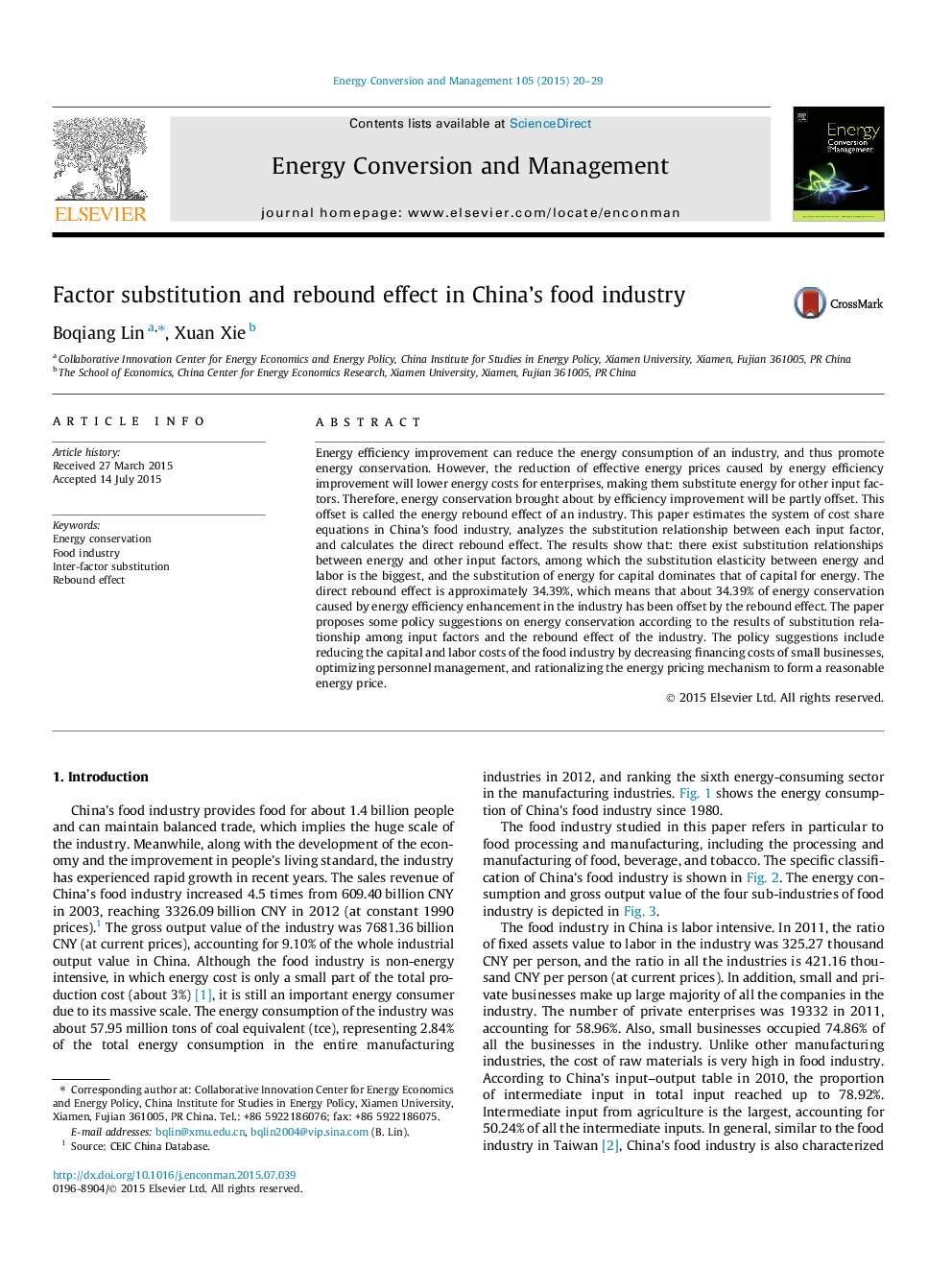| کد مقاله | کد نشریه | سال انتشار | مقاله انگلیسی | نسخه تمام متن |
|---|---|---|---|---|
| 7162012 | 1462857 | 2015 | 10 صفحه PDF | دانلود رایگان |
عنوان انگلیسی مقاله ISI
Factor substitution and rebound effect in China's food industry
ترجمه فارسی عنوان
جایگزینی فاکتور و تأثیر بازتوزیع در صنایع غذایی چین
دانلود مقاله + سفارش ترجمه
دانلود مقاله ISI انگلیسی
رایگان برای ایرانیان
کلمات کلیدی
حفاظت انرژی، صنایع غذایی، جایگزینی بین فاکتور، تأثیر بازتاب،
ترجمه چکیده
بهبود بهره وری انرژی می تواند مصرف انرژی یک صنعت را کاهش دهد و بنابراین صرفه جویی در انرژی را ترویج می کند. با این حال، کاهش قیمت های موثر انرژی ناشی از بهبود بهره وری انرژی، هزینه های انرژی برای شرکت ها را کاهش می دهد و آنها را جایگزین انرژی برای سایر عوامل ورودی می کند. بنابراین، صرفه جویی در انرژی از طریق بهبود بهره وری به طور جزئی جبران خواهد شد. این افست، اثر بازدارندگی صنعت یک صنعت است. این مقاله برآورد سیستم معادلات سهم هزینه در صنایع غذایی چین، تجزیه و تحلیل رابطه تعویض بین هر عامل ورودی، و محاسبه اثر مستقیم بازگشت است. نتایج نشان می دهد که: روابط جایگزینی بین انرژی و دیگر عوامل ورودی وجود دارد که در آن انعطاف پذیری جایگزین بین انرژی و نیروی بزرگترین است و جایگزینی انرژی برای سرمایه به عنوان سرمایه ای برای انرژی غلبه دارد. اثر مستقیم بازده حدود 34.39٪ است که به این معنی است که در حدود 34.39٪ از صرفه جویی در انرژی از طریق افزایش بهره وری انرژی در صنعت با اثر بازپرداخت جبران شده است. در مقاله حاضر، پیشنهادات سیاستگذاری در زمینه حفاظت از انرژی با توجه به نتایج روابط جایگزینی در میان عوامل ورودی و تأثیر بازتوزیع صنعت، پیشنهاد شده است. پیشنهادات سیاست شامل کاهش هزینه های سرمایه و نیروی کار صنایع غذایی با کاهش هزینه های تامین مالی کسب و کارهای کوچک، بهینه سازی مدیریت پرسنل و تصحیح مکانیسم های قیمت گذاری انرژی برای ایجاد یک قیمت مناسب انرژی است.
موضوعات مرتبط
مهندسی و علوم پایه
مهندسی انرژی
انرژی (عمومی)
چکیده انگلیسی
Energy efficiency improvement can reduce the energy consumption of an industry, and thus promote energy conservation. However, the reduction of effective energy prices caused by energy efficiency improvement will lower energy costs for enterprises, making them substitute energy for other input factors. Therefore, energy conservation brought about by efficiency improvement will be partly offset. This offset is called the energy rebound effect of an industry. This paper estimates the system of cost share equations in China's food industry, analyzes the substitution relationship between each input factor, and calculates the direct rebound effect. The results show that: there exist substitution relationships between energy and other input factors, among which the substitution elasticity between energy and labor is the biggest, and the substitution of energy for capital dominates that of capital for energy. The direct rebound effect is approximately 34.39%, which means that about 34.39% of energy conservation caused by energy efficiency enhancement in the industry has been offset by the rebound effect. The paper proposes some policy suggestions on energy conservation according to the results of substitution relationship among input factors and the rebound effect of the industry. The policy suggestions include reducing the capital and labor costs of the food industry by decreasing financing costs of small businesses, optimizing personnel management, and rationalizing the energy pricing mechanism to form a reasonable energy price.
ناشر
Database: Elsevier - ScienceDirect (ساینس دایرکت)
Journal: Energy Conversion and Management - Volume 105, 15 November 2015, Pages 20-29
Journal: Energy Conversion and Management - Volume 105, 15 November 2015, Pages 20-29
نویسندگان
Boqiang Lin, Xuan Xie,
